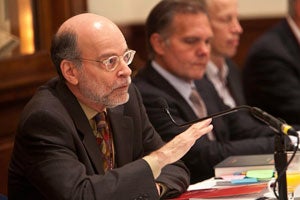A group of senior corporate managers, hedge fund, mutual fund, and private equity leaders, and economics and corporate law academics from Europe and the U.S. gathered at HLS on Sept. 14-15 for a conference on the role of corporate finance and governance in encouraging or discouraging long-term value in public corporations.
During the two-day conference, primarily organized by Harvard Law School Professors Reinier Kraakman and Mark Roe, participants examined how corporate governance structures, corporate law rules, financial market structures, market information flows, and standard corporate practices facilitate or impede achieving the best long-term value in large firms.

HLS Professor Reinier Kraakman co-organized the two-day roundtable with Professor Roe
Former Secretary of the Treasury of the United States Larry Summers, President Emeritus of Harvard University and the Charles W. Eliot University Professor of Harvard University, Harvard Kennedy School, delivered the keynote lunch address on Friday, Sept. 14, applying current thinking from behavioral economics on how excessive optimism from market participants can explain critical time horizon phenomena observed in financial markets.
Divided into six sessions, the roundtable focused on: Widely-held Stock: Impact on Corporate Time Horizons; Hedge Funds and Private Equity: Impact on Corporate Time Horizons; What is short-term?; On Foundations, Families, and the State: A Focus on the EU; Mergers, Hostile Tender Offers, and their Impact on Corporate Time Horizons; and The Non-monetizeable Long-term.

Harvard University Distinguished Service Professor and Austin Wakeman Scott Professor of Law Robert Clark, dean of Harvard Law School from 1989 to 2003
Each of the six sessions was introduced by an academic who described the core issues involved and summarized issues on which there is an academic consensus and those that are in dispute. Participants from the financial markets and corporate management then commented from their experience.
HLS participants included, in addition to Kraakman and Roe, Professors Robert Clark, John Coates, Luca Enriques, Allen Ferrell, Jesse Fried, Mark Ramseyer, Robert Sitkoff, and Holger Spamann. See the full list of participants, below. The law school’s project on Comparative Corporate Governance and Finance, which Reinier Kraakman recently founded, sponsored the event.
Roe said that the conference’s takeaway for him was to solidify the view that, while there’s evidence that financial markets can at times induce pernicious short-term corporate thinking, on balance there’s also much good evidence that key sectors of financial markets are generally more long-run oriented (like venture capital, publicly-owned technology companies, and research-oriented private firms).

John C. Coates, John F. Cogan, Jr. Professor of Law and Economics at Harvard Law School
“The short-term view has had substantial influence on corporate law thinking, usually in supporting insulating managers and boards from financial markets. Corporate law judges have written sympathetically to the short-termist pressures said to come from financial markets. But the actual overall impact of financial markets on time horizons is much more mixed than is conventionally thought, there are substantial correctives embedded in the corporate structure, and major pressures toward an unwarranted short-term come not from financial markets but from inside the firm, such as from a CEO’s time horizon attuned to his or her expected tenure at the helm. As such, using the time horizons view to justify isolating firms and boards further from stock markets is much less warranted than influential corporate thinking has had it,” he said.
Roundtable Participants
Michael J. Album
Proskauer Rose
Margaret Blair
Vanderbilt University Law School
Patrick Bolton
Columbia Business School
Chris Cernich
Institutional Shareholder Services
Robert Clark
Harvard Law School
John Coates
Harvard Law School
Isaac Corre
Eton Park Capital Management
Martijn Cremers
University of Notre Dame
Mendoza College of Business
Lynne Dallas
University of San Diego School of Law
Stephen Davis
Harvard Law School and the
Brookings Institution
Christian Dyvig
The Lundbeck Foundation
Luca Enriques
Harvard Law School
former commissioner
CONSOB (Italian SEC)
Allen Ferrell
Harvard Law School
Jesse Fried
Harvard Law School
Ronald Gilson
Columbia Law School
Jeffrey Gordon
Columbia Law School
Henry Hansmann
Yale Law School
Ben Heineman
Harvard Kennedy School
former general counsel,
General Electric
Gerard Hertig
ETH Zurich
Beat Hess
former legal director, Shell
Karl Hofstetter
Schindler Holding AG
Bengt Holmstrom
Massachusetts Institute of Technology
The Honorable Jack Jacobs
Delaware Supreme Court
Roy J. Katzovicz
Pershing Square Capital Management
Vic Khanna
University of Michigan Law School
April Klein
New York University
Leonard N. Stern School of Business
Elliot Konopko
Halcyon Asset Management (UK)
Reinier Kraakman
Harvard Law School
Michael Liss
Cipher Capital Partners
Yair Listokin
Yale Law School
John Martin Jr.
Time Warner, Inc.
Robert Mendelsohn
Navigators Group, Inc.
formerly of Royal & Sun Alliance
Peter Muelbert
Johannes Gutenberg-Universität Mainz
Scott Ostfeld
Partner, JANA Partners
Robert Pozen
MFS Investment Management
Mark Ramseyer
Harvard Law School
Mark J. Roe
Harvard Law School
Robert Sitkoff
Harvard Law School
Peter Y. Solmssen
Siemens AG
David Sorkin
Kohlberg Kravis Roberts & Co.
Holger Spamann
Harvard Law School
Richard A. Spillane, Jr.
Babson College
former president of Strategic Advisors,
Fidelity
Lawrence Summers
Harvard Kennedy School
Steen Thomsen
Copenhagen Business School
Randall Weisenburger
Omnicom Group, Inc
